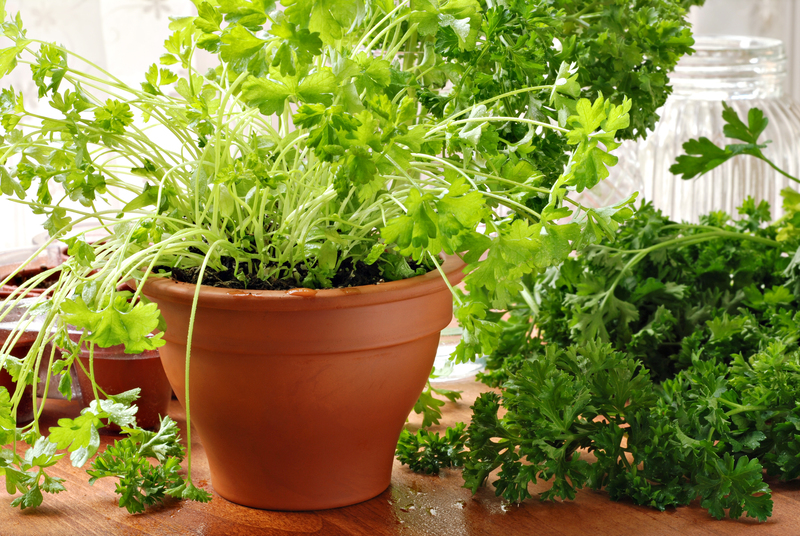Inspiring Curious Minds through Backyard Gardening
Posted on 11/09/2025
Inspiring Curious Minds through Backyard Gardening
Unlocking the full potential of young and adult minds can sometimes be as simple as planting a seed. Backyard gardening is a dynamic, engaging, and sustainable practice that has the power to inspire curiosity, promote learning, and foster a deep connection with nature. Whether you own a sprawling yard or a cozy urban patio, cultivating a garden at home is a rewarding endeavor that goes beyond producing food and flowers--it's about nurturing inquisitiveness and growing knowledge. In this comprehensive guide, we'll explore varied ways of inspiring curious minds through backyard gardening, offer practical steps, and highlight how every patch of green can spark life-long learning and wonder.

The Magic of Backyard Gardening for Learning and Discovery
Backyard gardening is a hands-on adventure waiting to be explored. This simple act of tending to plants and soil presents limitless opportunities for both children and adults to observe, experiment, and discover. Here's how a simple backyard transformation can nurture curiosity:
- Encourages hands-on learning: Practical experience fosters deeper understanding.
- Promotes scientific inquiry: Every seedling is a chance to hypothesize, observe, and analyze outcomes.
- Connects with environmental stewardship: Gardening develops respect for nature and ecology.
- Cultivates mental and emotional wellness: Immersing oneself in gardening relieves stress and inspires mindfulness.
Unlocking curiosity through gardening doesn't require a green thumb--just a willing mind!
Why Backyard Gardening Inspires Curiosity in All Ages
1. The Science Experiment That Never Ends
Plants are living test subjects that invite endless exploration and discovery in your backyard garden. From the moment you plant a seed, questions arise:
- How do plants grow?
- Which soil and sunlight conditions are best?
- Why do leaves change color?
- What creatures help or harm my garden?
Children quickly become scientists by asking questions, forming hypotheses, and watching as nature conducts the experiment. Backyard gardening for inquisitive minds is a STEM playground filled with biological processes, chemical reactions, and physics in action.
2. Encouraging Observation, Documentation, and Patience
Gardening nurtures attention to detail and patience--skills key to lifelong learning. Gardeners regularly observe changes in plants, track germination rates, and monitor pests or pollinators. This ongoing observation fosters:
- Detailed note-taking: Keeping a garden journal develops recording and analytical skills.
- Visual awareness: Noticing subtle differences in leaf shapes, colors, or flower patterns sharpens perception.
- Endurance: Waiting for seeds to grow or produce fruit teaches patience and persistence.
3. Stimulating Creativity and Ingenuity
Backyard gardening isn't just scientific--it's also wildly creative. From designing planting patterns to constructing trellises and whimsical fairy gardens, gardening taps into artistic talents and stimulates innovative thinking. Children and adults alike find new ways to repurpose materials, design garden beds, and solve challenges--skills useful far beyond the garden gate.
4. Building Problem-Solving Skills
Every gardener faces obstacles: insects, plant diseases, harsh weather, and soil imbalances. Adapting and finding solutions teaches effective problem-solving, resilience, and resourcefulness. Cultivating curiosity through backyard gardening is an ongoing exercise in critical thinking and adaptability.
The Many Benefits of Inspiring Curious Minds through Backyard Gardening
The personal and community-wide advantages of gardening are plentiful and profound. Here's how backyard gardening transforms curious minds into inspired and capable individuals:
- Boosts academic skills: Integrates math, science, reading, and art seamlessly.
- Develops environmental empathy: Fosters care for the planet and local wildlife.
- Improves nutritional awareness: Encourages healthy eating and understanding food origins.
- Builds community and family bonds: Gardening together strengthens relationships.
- Promotes physical health: Outdoor movement and activities keep bodies active and healthy.
Getting Started: How to Inspire Curiosity with Your Backyard Garden
Ready to spark wonder and ignite imagination right outside your back door? Follow these essential steps to transform your backyard into a laboratory for discovery and a haven for inquisitive gardening minds.
1. Involve All Age Groups
- Let kids choose seeds: Empower curiosity by involving children in seed and plant selection.
- Encourage intergenerational gardening: Learning is mutual among grandparents, parents, and children.
*Tip:* Assign specific plants or beds for each person in the family to foster ownership and engagement.
2. Start Small and Observe Closely
- Container gardening: Patio or urban dwellers can grow herbs, tomatoes, or flowers in pots and planters.
- Raised beds: Ideal for controlling soil quality and minimizing weeding.
*Tip:* Place your garden where it's easily accessible for daily observation--curiosity grows with regular exposure!
3. Create a Science-Friendly Garden
Transform your backyard into a living laboratory:
- Install a rain gauge and thermometer: Track precipitation and temperature for weather analysis.
- Build a compost pile: Observe decomposition and the role of decomposers like worms.
- Nature journal area: Set up a bench or table with notebooks, magnifying glasses, and colored pencils for documenting discoveries.
4. Encourage Experimentation and Play
- Design garden mazes or fairy gardens: Inspire imaginative play and creative storytelling.
- Conduct seed trials: Plant the same species in different areas to compare sunlight, water, and soil impacts.
Curiosity thrives where experimentation is encouraged and mistakes are seen as learning opportunities!
Fun and Educational Gardening Activities for Curious Minds
Spark excitement and learning with these hands-on backyard gardening ideas:
- Grow a rainbow garden: Plant vegetables and flowers of every color and learn about plant pigments.
- Set up a butterfly or pollinator patch: Attract and observe bees, butterflies, and hummingbirds.
- Seed sprouting race: Compete to see which seeds sprout fastest under different conditions.
- Leaf and bark rubbings: Discover leaf shapes and tree textures.
- Soil testing: Experiment with different soil amendments and measure plant growth.
- Herb sensory garden: Explore the five senses with fragrant, textured, and flavorful plants.
- Build a worm farm: Study decomposers and nutrient cycling up-close.
These activities not only nurture curiosity through engaging backyard garden projects, but they also subtly teach core scientific principles and artistic concepts.
The Transformative Effects of Gardening on Curious Young Minds
Building Confidence and Independence
When children take responsibility for a garden--watering, weeding, harvesting--they develop a sense of achievement and self-sufficiency. The visible progress of their plants strengthens self-esteem and motivates further exploration.
Mental Health and Emotional Growth
Exposure to green spaces and the natural rhythms of plant life has proven benefits for reducing anxiety and boosting mood. Gardening offers a peaceful retreat for reflective thought and mindful observation, essential for healthy brain development.
Encouraging Lifelong Learning
The curiosity cultivated in the garden doesn't stop at the backyard fence--it extends to classrooms, communities, and life-long pursuits. Children raised in garden-rich environments are more likely to explore science, nutrition, art, and environmental advocacy in the future.
Tips for Sustaining Curiosity with Your Backyard Garden
- Rotate crops: Trying new varieties each season keeps discoveries fresh.
- Invite experts: Host local gardeners or biologists for workshops and Q&A sessions.
- Visit public gardens: Explore botanical gardens or farms for inspiration and new ideas.
- Document adventures: Take photos, create scrapbooks, or write stories inspired by your backyard.
- Connect digitally: Share progress through social media or join online gardening communities to exchange ideas and solutions.

Accessible Gardening for Every Curious Mind
You don't need extensive land or prior experience to begin your journey--backyard gardening for curiosity is possible in any space. Here's how to adapt:
- Balcony and patio gardening: Maximize small spaces with vertical racks, hanging pots, and compact vegetable varieties.
- Community plots: Join a local communal garden and share resources, knowledge, and ideas.
- School and workplace gardens: Advocate for garden programs in schools or offices to multiply benefits for all ages.
*Remember:* The heart of inspiring curious minds through gardening is not the size of your plot, but the enthusiasm for growth--and a willingness to learn alongside nature.
Conclusion: Planting Seeds of Wonder for a Lifetime
In a world increasingly driven by screens and fast answers, the garden stands as a gentle antidote--offering slow growth, endless questions, and joyful surprises. By inspiring curious minds through backyard gardening, you empower yourself and your family to cultivate not only healthy vegetables and beautiful blooms, but also resilient, inventive, and environmentally conscious citizens.
So, gather your seeds, embrace the dirt under your nails, and let curiosity take root--your backyard is waiting to become a sanctuary of discovery and wonder.
Begin your backyard gardening journey today and watch as curiosity blossoms in every corner of your outdoor retreat.
Latest Posts
Effortless Orchid Care for Every Plant Enthusiast
The allure of growing plants through container gardening
Innovative Ideas for Building Enchanting Garden Seating Zones
Harmonize Your Garden with Peaceful Zen Landscaping Concepts

